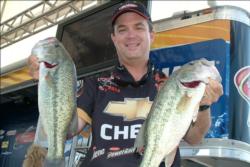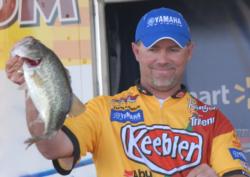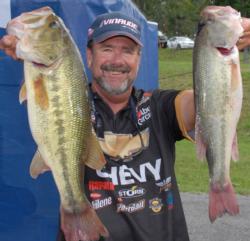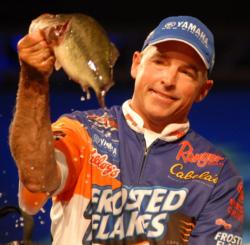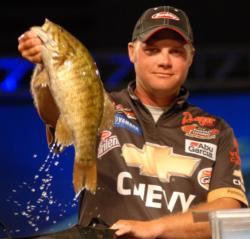2009 Forrest Wood Cup preview: The pros weigh in
FLW Tour pros chat with FLWOutdoors.com about the upcoming July 30-Aug. 2 Cup battle in Pittsburgh
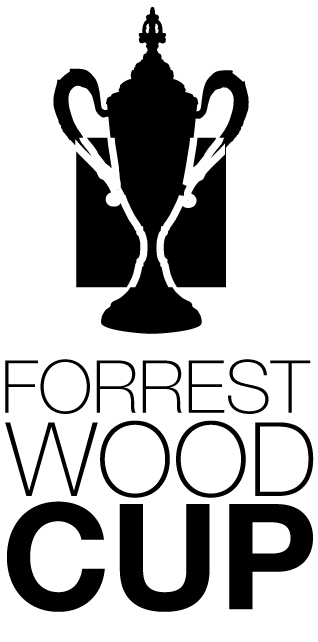
With the 2009 Forrest Wood Cup quickly approaching, FLWOutdoors.com contacted five of the nation’s top FLW Tour pros to get their take on what bass-fishing fans can expect to see during the nation’s premier bass-fishing championship. While the anglers addressed a variety of topics, one thing is clear: The Three Rivers battle will offer up some brutally tough fishing conditions.
As the pros depart the confines of downtown Pittsburgh to head out onto the open waters of the Allegheny, Monongahela and Ohio river systems in just a few short days, it’s obvious that strategy and mental toughness will be at a premium as well. But with a total purse of $2 million on the line, as well as a potential first-place award of $1 million, it’s also clear that anglers will have to reach down deep and exhaust their entire fishing arsenal in order to have a realistic chance at walking away with the top prize – the 2009 Forrest Wood Cup title.
Q&A with the 2009 Forrest Wood Cup qualifiers
FLWOutdoors.com: What does it mean to qualify for the Cup?
Yelas: Qualifying for the Cup is an honor and a great accomplishment. Having a chance to win the world championship – that’s been my goal all year. It’s definitely very gratifying to have qualified. It’s going to be an exciting tournament. It’s going to be a close tournament. I just hope to come out on top.
FLW: Just how tough will the fishing be in Pittsburgh?
Yelas: I fished the Bassmaster Classic in Pittsburgh in 2005, and I expect (the 2009 Forrest Wood Cup) to fish about the same. However, I should come right out and tell you that, at the Classic, I blanked the first two days – the only tournament in my entire life where that happened – so I’m not sure how much of an expert I am on these waters. But that being said, there was a team tournament in Pittsburgh a few weeks ago, and I think the winning team had 8 pounds total – and that was with two guys fishing, a pro and an amateur. So it’s definitely going to be a tough tournament. I would think that 6 pounds might be the leading weight after the first day. It’ll probably take 9 pounds total to make the (two-day) cut. And my guess is that it could take 10 pounds over the final two days to win it. I know I’d take that weight right now.
This just might be the toughest tournament FLW Outdoors has ever had. There’s just not a lot of habitat for the fish to thrive in around Pittsburgh. It’s basically a big piece of water that is devoid of bass habitat. Also, some of the best water we fished during the Classic is going to be off limits for the Cup.
This tournament is definitely going to be difficult, but everyone knows that going in – the anglers as well as the fans. But I’m excited. I like tough tournaments. We’re just going to try our best and have fun with it.
FLW: What is your strategy heading into the Cup?
Yelas: You have to approach Pittsburgh the same way you do other tournaments. You’re either going to have to pick an area or find a pattern that you can use while covering a lot of water. However, your expectations are going to have to be reduced as well. If I remember correctly, during the 2005 Bassmaster Classic, Kevin VanDam won the three-day tournament with 12 pounds, 15 ounces – so it’s going to be tough. As far as tackle, plastics are going to be huge. There are also going to be some fish caught on small crankbaits and jerkbaits. Basically, you’re going to be fishing for 12- to 13-inch fish the entire time. Again, if I remember correctly, I think the biggest fish caught during the 2005 Classic weighed in at 2 pounds, 15 ounces. And that’s why you can’t be wasting a lot of your time fishing big jigs trying to find 4-pounders because those large fish really don’t live around there.
FLW: In your opinion, who are the main Cup contenders?
Yelas: There are two guys off the top of my head who I think should do well. The first is Dave Lefebre. He’s from Pennsylvania, and he’s fished there several times before. The other is Mike Iaconelli. He finished the 2005 Bassmaster Classic in the top five, knows the water very well and has had all summer to prepare.
——————————–
FLWOutdoors.com: What does it mean to qualify for the Cup?
Lefebre: Qualifying for the Cup has pretty much been my goal every year, but when I found out it was going to be in Pittsburgh, it was a pretty big deal for me. I’ve pretty much never had a tournament of this magnitude so close to home before (Lefebre is a resident of Union City, Pa.). There was a lot of pressure on me to qualify for this year’s Cup, and I didn’t really clinch it until the last FLW Tour event on Lake Champlain. Right now it’s actually more of a relief that I made it.
FLW: Just how tough will the fishing be in Pittsburgh?
Lefebre: Everybody is judging the fishing for this year’s Cup based on what happened at the (2005) Bassmaster Classic. But I can tell you for sure that it won’t be as tough as that. It’s going to be tough, but not that tough. There are a lot of variables on those three rivers, and sometimes those rivers just have off years – and that was the case in 2005. But this year, that shouldn’t be an issue. The fish are definitely there, and you’ll see lots of limits caught as opposed to the Classic, where there was almost none. The potential is there this time to catch a huge limit – and by huge I mean about 10 pounds. But an extremely solid limit will be about 7 pounds. The other reason I think we’ll do better than the Classic (results) is that FLW guys are used to fishing river systems more than the BASS guys, so I think that’s going to make a difference as well.
FLW: What is your strategy heading into the Cup?
Lefebre: I think you’re going to see a lot of finesse baits – pretty much the same baits that you’d throw at Beaver Lake. People are going to be using light line, but you could see people use anything from spinnerbaits to jerkbaits to jighead worms. It’s just so hard to predict. The fish just got done spawning, so the fishing could be unpredictable. The guy who wins this is going to be the guy who gets one or two quality bites.
FLW: In your opinion, who are the main Cup contenders?
Lefebre: I’m going to say that this type of fishing really suits Shinichi Fukae pretty well. Another guy who should do well is Luke Clausen, as it fits his style of fishing. Besides myself, the other guys who should do well are guys who cover a lot of water – somebody like a Clark Wendlandt.
——————————–
FLWOutdoors.com: What does it mean to qualify for the Cup?
Nixon: It means a lot to qualify for the Cup. It’s such a prestigious event, it’s a big-money event, and it’s always heartbreaking if you don’t qualify.
FLW: Just how tough will the fishing be in Pittsburgh?
Nixon: I fished the Classic back in ’05, so I know how tough it is. We’re going to have four days of practice with 77 contestants, and I can’t see much being left after practice days. So I really think this is going to be as tough of a tournament as we’ve ever seen. These guys who think it’s going to fish better than the Classic – I just don’t see it. That river doesn’t have much (fishable) water, so we could find ourselves really bunched up. There is very little in the way of backwater lake systems, so we’re really going to be on top of each other. Plus, you have to deal with locking through and all of the idle zones, which is going to make for some really long days. And the lockmasters don’t mess around there. They are going to wait until every single boat is properly tied up before you get moving. Factoring that in, you might only have two and a half solid fishing hours each tournament day.
Also, a lot of the water we caught fish on last time (at the Classic), we’re prohibited from fishing this time around. This year, the best water is a long way away. Overall, I just look for it to be a tremendously difficult tournament. As far as weights are concerned, I think that if you catch three or four fish each day, it just might be enough to make the cut.
FLW: What is your strategy heading into the Cup?
Nixon: Heading into this event, you just have to realize that it’s going to be a tough tournament. It’s a very, very limited fishery. So you have to figure out an area where everybody isn’t going to go. My strategy is to fish to the best of my ability and see what happens from there. I’m going to have to come up with a lure or style that’s different from what everyone else is using. As far as bait and tackle is concerned, I think the drop-shot will be good, but it’s really hard to say. I was there last time (at the Classic), and I didn’t do very well. I’m just going to have to depend on my four practice days. I’ll see what happens from there.
FLW: In your opinion, who are the main Cup contenders?
Nixon: I think the local boys who have fished that system before should do well. Dave Lefebre knows that system well. He probably knows consistent stretches of river that should be good, while the rest of us know close to nothing. Mike Iaconelli is going to be tough as well – that’s his part of the country.
——————————–
FLWOutdoors.com: What does it mean to qualify for the Cup?
Wendlandt: My goals at the beginning of the year are to win Angler of the Year and qualify for the Forrest Wood Cup, so I would have been very disappointed had I not qualified. Right now I think you’re looking at the anglers who are fishing the best heading into the biggest event of the year. I think the field is stacked pretty well, so it’s definitely an honor to be able to participate.
FLW: Just how tough will the fishing be in Pittsburgh?
Wendlandt: It’s going to be tough. If you look at the ’05 Classic, it only took about 12 pounds to win (over three days). I think the biggest fish caught during that event was just under 3 pounds, so you really have to approach this tournament in an entirely different way. It might fish a little bit better than the Classic, but it’s still not going to be easy. In this tournament you’re really going to have to focus on catching keeper fish. You’re going to have to adjust your mindset, because unlike most of the other tournaments we fish where you try to catch big fish, here you’re going to have to concentrate on just catching a limit. And that’s what I’m going to be focusing on – just trying to catch a limit every day. If you’re able to do that, I think you’ll make the cut. But like other events, it’s also going to come down to making the right decisions at the right time.
FLW: What is your strategy heading into the Cup?
Wendlandt: The two words that come to mind are “small” and “finesse.” The main strategy, as far as my mindset is concerned, is maximizing the number of keeper bites. I think you’re going to see a lot of spinning rods, small finesse baits and light line.
FLW: In your opinion, who are the main Cup contenders?
Wendlandt: You know, anybody who has experience fishing these waters before is going to have an upper hand. David Walker fished the Classic in 2005 and did pretty well. Jay Yelas also fished here before, although he didn’t do too well last time. And Dave Lefebre, he knows these waters about as well as anyone.
——————————–
FLWOutdoors.com: What does it mean to qualify for the Cup?
Clausen: I’m definitely glad to qualify for the Cup. After coming in second in this year’s Angler of the Year standings, it’s a chance for redemption for me. I’m also more excited about qualifying for the Cup this year than some of the other years, because even though it’s going to be tough fishing, I think it could be one of the easiest championships to win. It’ll definitely be challenging, but I think this tournament is going to lend itself to the anglers who are more mentally tough. And I kind of like that aspect of it.
FLW: Just how tough will the fishing be in Pittsburgh?
Clausen: For starters, we’re dealing with a different class of fish and a river with very little current. The fish are also probably going to be as inactive as they have been all year. In a lot of ways, it’s hard to figure out how to catch fish to even start with. They’ve also taken away a lot of the water for this event that we got to fish at the Classic, so that’s going to make it tougher as well.
Overall, I think the fishing will be similar to the Classic, so a limit a day is going to be golden. Coming into this event, I’d say that 6 pounds a day would be pretty good, but it’s really hard to say how much weight you’ll need until you finally start practicing. There is not a lot of offshore structure so you could see a lot of people piling up around the banks. My guess is that you’re going to see a lot of day-to-day flip-flops in the standings as well.
FLW: What is your strategy heading into the Cup?
Clausen: You’re going to need to figure out a really strong pattern or find a couple of locations that nobody’s really fishing. You’re going to see a lot of finesse-type baits. Personally, I don’t usually carry that much small tackle, so I’m actually stocking up right now. I’m definitely heading into this tournament with a lot more tools than I usually bring. I think it’s also going to take a multitude of techniques each day to have success as well. You’re probably going to have to fish a variety of baits at each location and then move on to the next location and do the same thing. It’s going to be junk-fishing at its finest.
FLW: In your opinion, who are the main Cup contenders?
Clausen: When it comes right down to it, it’s still fishing. But the people who have strong mental games – like Clark Wendlandt and Andy Morgan – those are the type of guys who are going to be tough to beat. It’s going to be hard for a lot of the guys in the field to stay focused, especially when they’re not catching anything. So the anglers with a strong mental makeup should have an advantage.
